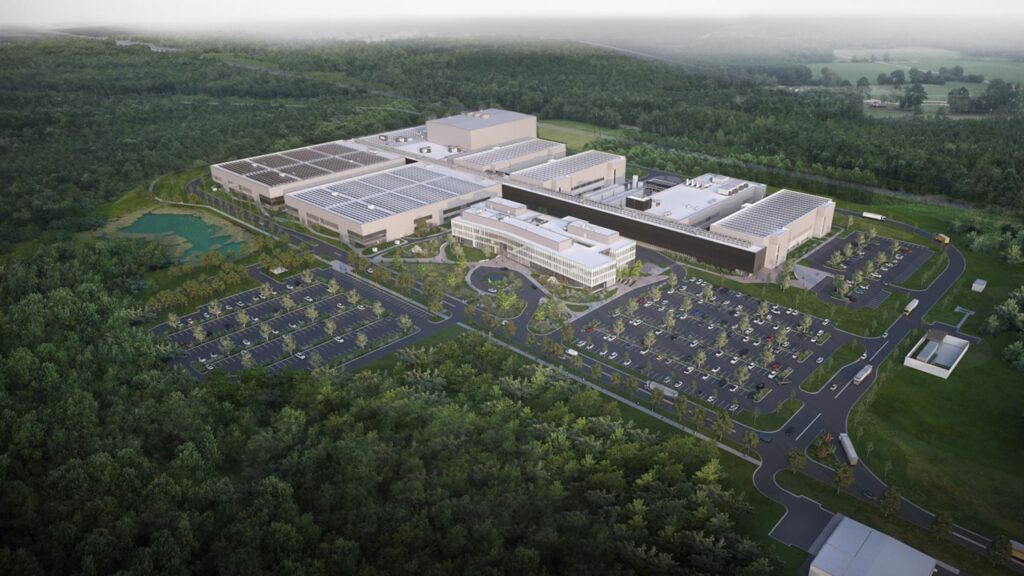Big Pharma’s Manufacturing Muscle: What Major Expansions Are Underway?
Multi-billion dollar investments by Novo Nordisk and Eli Lilly and Company to increase manufacturing capacity for their GLP-1 drugs represent the largest capital expansions by the large bio/biopharma companies. What are the details of those plans and other key expansions by the large companies?
By Patricia Van Arnum, Editorial Director, DCAT, pvanarnum@dcat.org

Rendering of Novo Nordisk’s site in Clayton, North Carolina, with new production facilities announced June 24, 2024, to be completed in 2027-2029.
Manufacturing strength
By far, Novo Nordisk and Eli Lilly and Company are leading manufacturing investment among the large bio/pharmaceutical companies. Part of the impetus behind their capital expansions is strong demand for their blockbuster drugs for treating Type 2 diabetes/obesity, respectively Novo Nordisk’s Ozempic/Wegovy/Rybelsus (semaglutide) and Lilly’s Mounjaro/Zepbound (tirzepatide). Both companies have announced multi-billion plans to increase capacity for both active pharmaceutical ingredients (APIs) and fill–finish capacity for these drugs as well as for other commercial products and pipeline assets. They are increasing capacity both organically through internal expansions as well as through acquisitions. Below are highlights of key manufacturing expansions by these companies and other large bio/pharmaceutical companies announced in 2024.
Novo Nordisk and Lilly lead the way
Novo Nordisk. Just this week (June 24, 2024), Novo Nordisk announced yet another multi-billion manufacturing expansion. The company plans to invest $4.1 billion to build a second fill–finish manufacturing facility at its site in Clayton, North Carolina. Marking one of the largest manufacturing investments in Novo Nordisk’s history, the expansion will add 1.4 million square feet of production space for aseptic manufacturing and finished production processes, doubling the combined square footage of all three of the company’s existing facilities in North Carolina. Early clearing and foundational work are already underway to prepare the 56-acre facility footprint. Construction will gradually be finalized between 2027 and 2029.
Overall, in 2024, Novo Nordisk will increase actual investments in production and plans to invest approximately $6.8 billion in production compared to actual investments of $3.9 billion in 2023 to increase supply. Novo Nordisk has a global manufacturing network with five strategic production sites in Denmark, the US, France, Brazil, and China.
But in its largest move, Novo Nordisk is expanding its manufacturing capacity through acquisition, namely its $16.5-billion acquisition of the CDMO, Catalent, by Novo Holdings, the parent company of Novo Nordisk, which upon closing of the acquisition will net Novo three fill–finish sites and related assets in Anagni, Italy; Bloomington, Indiana; and Brussels, Belgium. The merger is expected to close toward the end of 2024, subject to customary closing conditions, including approval by Catalent stockholders and receipt of required regulatory approvals. After closing, Novo Holdings plans to sell the three fill–finish sites to Novo Nordisk for $11 billion. The Catalent acquisition is expected to gradually increase Novo Nordisk’s filling capacity from 2026 and onwards.
Lilly. Last month (May 2024), Lilly announced an additional investment of $5.3 billion to increase active pharmaceutical ingredient (API) manufacturing capacity at its site in Lebanon, Indiana, which more than doubles its current investment of $3.7 billion at the site to bring its total investment to $9 billion. The expansion will increase API manufacturing capacity for Mounjaro (tirzepatide) for treating Type 2 diabetes and Zepbound (tirzepatide) for treating obesity/weight management. Lilly says it expects to begin making medicines in Lebanon toward the end of 2026, with operations scaling up through 2028.
Since 2020, Lilly has committed more than $16 billion to develop new manufacturing sites in the US and Europe. New locations outside Indiana include Research Triangle Park and Concord, North Carolina; Limerick, Ireland; and Alzey, Germany. In 2023, Lilly broke ground on a new $1-billion biotech manufacturing campus in Raheen, County Limerick, Ireland, which will be Lilly’s most advanced manufacturing site for existing monoclonal antibodies. This site will produce existing products as well as the company’s pipeline of clinical products by 2026. Additionally, the company plans to invest $500 million in Limerick to create a new biologics active ingredients site. The new $1.5-billion combined investment in Ireland is in addition to an $1-billion investment that the company announced in January 2022, for a new injectable products and devices manufacturing site in Concord, North Carolina. In Alzey, Germany, the company is constructing a new $2.5-billion injectable manufacturing site to expand the company’s global parenteral (injectable) product and device manufacturing network and support increased demand for Lilly’s medicines, including its diabetes and obesity portfolio. Separately, the company has invested an additional $1.2 billion to update existing manufacturing facilities in Indianapolis and recently acquired an injectable manufacturing facility in Pleasant Prairie, Wisconsin, from Nexus Pharmaceuticals. Together, these manufacturing investments total more than $18 billion.
AstraZeneca, Sanofi, Daiichi Sankyo, Bristol-Myers Squibb, J&J
AstraZeneca. Earlier this year (May 2024), AstraZeneca announced plans to build a $1.5-billion manufacturing facility in Singapore for antibody drug conjugates (ADCs). The planned greenfield facility, supported by the Singapore Economic Development Board, will be AstraZeneca’s first end-to-end ADC production site, fully incorporating all steps of the manufacturing process at a commercial scale. AstraZeneca says it aims to begin design and construction of the manufacturing facility by the end of 2024, with targeted operational readiness from 2029.
In addition, AstraZeneca is investing $300 million in a new cell-therapy manufacturing facility in Rockville, Maryland, initially for clinical-trial-material supply. The company also plans to invest £450 million ($482 million) to research, develop, and manufacture vaccines at its site Speke, Liverpool, UK, according to information from the UK government.
Sanofi. In May 2024, Sanofi announced an investment of EUR 1.1 billion ($1.2 billion) to create new bioproduction capacity at its sites in France: Vitry-sur-Seine (Val de Marne), Le Trait (Seine-Maritime), and Lyon Gerland (Rhône). This biomanufacturing investment project is in addition to EUR 2.5 billion ($2.71 billion) already committed in major projects in France.
In Vitry-sur-Seine, Sanofi will invest EUR 1 billion ($1.1 billion) to build a new facility that will double the site’s monoclonal antibody production capacity to meet anticipated demand for several biologics that the company pegs as potential blockbusters. The company projects that 12 potential blockbusters could be produced in Vitry. At its site in Le Trait, Normandy, Sanofi will invest EUR 100 million ($109 million) to develop new capacity for biologics formulation, filling, device assembly, and packaging to support the launch of future biologics and vaccines, as well as the continued growth of Dupixent (dupilumab), an anti-inflammatory drug for multiple indications, including atopic dermatitis and asthma. Dupixent was the company’s top-selling drug in 2023 with sales of EUR 10.7 billion ($11.6 billion). At its site in Lyon Gerland, Sanofi is investing EUR 10 million ($11 million) to locate the production in France of TZield (teplizumab-mzwv), a drug to treat Type 1 diabetes. Sanofi acquired the drug in April 2023 through its $2.9-billion acquisition of Provention Bio, a Red Bank, New Jersey-based bio/pharmaceutical company; the drug had been manufactured outside of Europe.
Sanofi’s latest biomanufacturing investments are in addition to EUR 2.5 billion ($2.71 billion) already committed in major projects in France. The largest piece of that investment is EUR 500 million ($543 million) to build a manufacturing facility for biological drugs and vaccines, including mRNA, at it is site in Neuville-sur-Saône, France, scheduled to launch in 2025.
Other investment projects in France include: (1) EUR 250 million ($272 million) at its site in Val de Reuil, to build a flu vaccine production unit and locate several production stages of Fluzone High-Dose /Efluelda, its high-dose flu vaccine; (2) EUR 60 million ($65 million) to build a small-volume launch unit for the production of active ingredients at is site in Sisteron; (3) EUR 20 million ($22 million) to increase production capacity by 140 million boxes per year for Doliprane (acetaminophen), an analgesic, at its site in In Lisieux; in Tours, EUR 15 million ($16 million) to locate the production of an anti-cholesterol drug in France and to construct a new high-volume granulation unit and a tablet-coating line in a new building, with capacity of the new unit of approximately 700 million boxes per year.
In addition, last month (June 2024), Sanofi opened a new CAD $800 million (US $584 million) pediatric and adult vaccine manufacturing facility at its campus in Toronto, Canada. The new facility increases capacity to meet growing Canadian and global demand for pediatric and adult vaccines for pertussis (whooping cough), diphtheria, and tetanus.
Daiichi Sankyo. Daiichi Sankyo is investing approximately EUR 1 billion ($1.1 billion) to expand its production and development site in Pfaffenhofen an der Ilm, Germany (north of Munich) into an international innovation center. The expansion is expected to be completed by 2030 at the latest, according to the company. Production capacity will be added to support cardiovascular drugs, and new laboratories will be established for antibody drug conjugates (ADCs). The new building for Daiichi Sankyo’s ADCs is expected to be completed by the end of 2026. In the future, cancer therapies for breast, lung, and stomach cancer, among other cancer drugs, will be developed and manufactured in Pfaffenhofen.
Bristol-Myers Squibb. Earlier this year (2024), Bristol Myers Squibb announced a $400-million investment at its Dublin, Ireland (Cruiserath) campus for the build and design of a sterile drug-product (SDP) manufacturing facility. This will be the company’s first European SDP facility for biologics and will add drug-product manufacturing capabilities to the site, which now supports biologic manufacturing operations for bulk drug substances. The facility is expected to be completed in 2026.
Johnson & Johnson. Earlier this month (June 2024), Johnson & Johnson Innovative Medicine, the pharmaceutical segment of Johnson & Johnson (formerly named Janssen) announced a projected investment of EUR 580 million ($620 million) in Italy over the next five years, of which EUR 125 million ($134 million) will support an increase in production capacity. The company’s site in Latina, Italy, is part of Johnson & Johnson’s global supply chain network. The site produces more than four billion tablets every year, for about 30 different products, with 97% of its production exported. The investment plan will enable a production capacity increase of more than 25%, as it includes projects to support pipeline products and new production technologies, such as a Flex Line, to more efficiently handle the packaging of small production batches and a new continuous manufacturing line.
Other investments: AbbVie, Novartis & Takeda
AbbVie. Earlier this year (2024), AbbVie broke ground on a new $223-million expansion of its Singapore manufacturing facility. AbbVie’s Singapore plant is a small-molecule and biologics manufacturing facility. The new investment will add 24,000 liters of biologics drug-substance capacity. With this latest investment, AbbVie has invested more than $740 million in acquiring, modernizing and expanding its Singapore facility over the past 10 years. The expansion is slated to begin operations in 2026.
Novartis. Earlier this year (March 2024), Novartis broke ground for a $256-million expansion of its biopharmaceutical manufacturing plant in Singapore to deploy digital and automation to enhance manufacturing productivity.
Takeda. Earlier this month (June 2024), Takeda announced a $230-million expansion of manufacturing capacity for plasma-derived therapies at its plasma-fractionation facility in Los Angeles, California. This represents one of Takeda’s largest single investments in manufacturing capacity expansion at Los Angeles site, which is Takeda’s largest fractionation site in terms of capacity globally.





